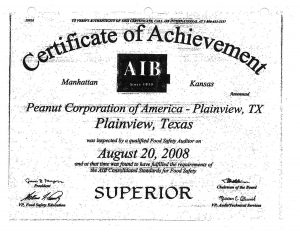According to the West Plains Daily Quill, Ozarks Food Harvest received high marks on its food safety inspection from AIB International. For six years, southwest Missouri’s only regional food bank has held this superior food safety certification.
 Except AIB – based in Manhattan, Kansas – has given superior plus plus ratings to some of the worst food offenders in the past decade: Peanut Corporation of America (which supplied the idiots at Kelloggs), DeCoster eggs and dozens more.
Except AIB – based in Manhattan, Kansas – has given superior plus plus ratings to some of the worst food offenders in the past decade: Peanut Corporation of America (which supplied the idiots at Kelloggs), DeCoster eggs and dozens more.
When Ozarks Food Harvest first received this certification in 2012, it was only the sixth Feeding America food bank of 200 in the country to do so.
The auditing tragedy is bad people taking money from people trying to do good.
Audits and inspections are never enough: A critique to enhance food safety
2012, Food Control
D.A. Powell, S. Erdozain, C. Dodd, R. Costa, K. Morley, B.J. Chapman
http://www.sciencedirect.com/science/article/pii/S0956713512004409?v=s5
Abstract
Internal and external food safety audits are conducted to assess the safety and quality of food including on-farm production, manufacturing practices, sanitation, and hygiene. Some auditors are direct stakeholders that are employed by food establishments to conduct internal audits, while other auditors may represent the interests of a second-party purchaser or a third-party auditing agency. Some buyers conduct their own audits or additional testing, while some buyers trust the results of third-party audits or inspections. Third-party auditors, however, use various food safety audit standards and most do not have a vested interest in the products being sold. Audits are conducted under a proprietary standard, while food safety inspections are generally conducted within a legal framework. There have been many foodborne illness outbreaks linked to food processors that have passed third-party audits and inspections, raising questions about the utility of both. Supporters argue third-party audits are a way to ensure food safety in an era of dwindling economic resources. Critics contend that while external audits and inspections can be a valuable tool to help ensure safe food, such activities represent only a snapshot in time. This paper identifies limitations of food safety inspections and audits and provides recommendations for strengthening the system, based on developing a strong food safety culture, including risk-based verification steps, throughout the food safety system.
